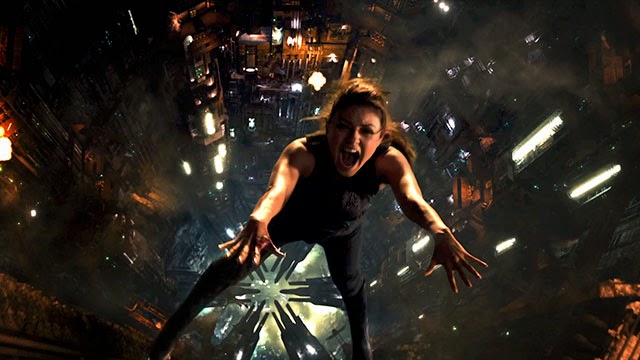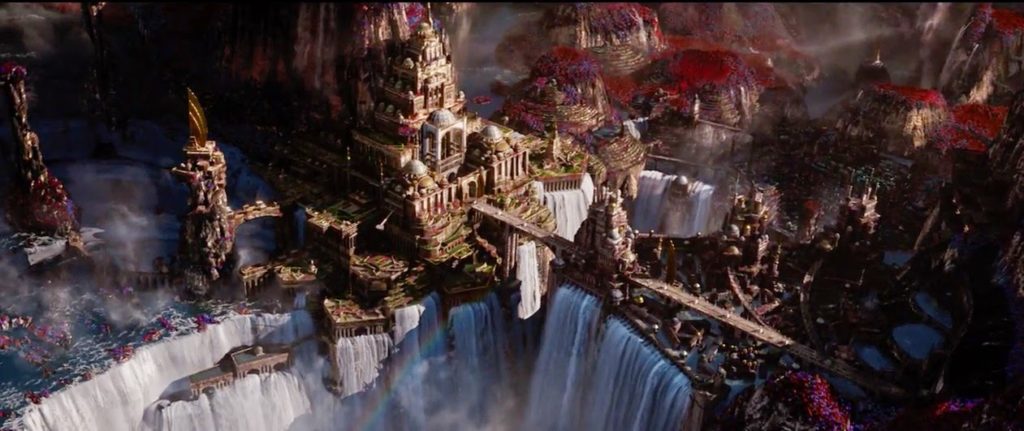You have to hand it to Andy and Lana Wachowski: They don’t do things halfway. The Matrix was a heroic work of maniacal vision, but even their lesser movies, like the vibrantly colorful Speed Racer and the cockamamie, sporadically delightful Cloud Atlas (which they co-directed with Tom Tykwer) felt like products of artistic aspiration rather than dutiful commercialism. Now they return with Jupiter Ascending, a grandiloquent space opera that attempts to fuse the galaxy-trotting mythology of Star Wars with the familial treachery of Shakespeare. It is a labor of love, with emphasis on the labor. Like all of the Wachowskis’ films (with the exception of their first feature, the taut, terrific crime thriller Bound), this one strains for greatness; unlike their early catalog, it is ultimately weighed down by its own leaden seriousness. An enormously ambitious undertaking, Jupiter Ascending glistens with flop sweat, and you can sense the frantic desperation of its creators. It’s a valiant effort, which is another way of calling it a noble failure.
Not a typical one, though. There is far too much visual splendor and painstaking world-building on display here to dismiss Jupiter Ascending as yet another trifling, noisy, wannabe franchise-starter. After a ludicrous prologue set in Russia, we begin on a faraway planet, where Kalique and Titus Abrasax (Tuppence Middleton and Douglas Booth), two royal siblings dressed in finery, talk idly about the colonization of distant worlds. They are interrupted by their elder brother, Balem (a campy, scenery-munching Eddie Redmayne), who appears suddenly by stepping through a shimmering void in the air. The three speak in the thin politeness that masks bitter jealousy, and their social hierarchy is made clear when Titus casually asks Balem if he might consider parting with one of his more valuable properties. “What’s it called? Earth?”
So it is, though when we first return to the third body in our solar system, its purported value seems thoroughly inflated. That would certainly be the opinion of Jupiter Jones (Mila Kunis, doing her best), who grumbles “I hate my life” when she is roused each morning by her mother (Orphan Black‘s Maria Doyle Kennedy). Possibly the most well-kept maid in cinematic history, Jupiter lives a Cinderella-like existence, unhappily scrubbing toilets and squabbling with her boisterous extended family. She harbors the simple dream of buying a telescope, and so she grudgingly agrees to her cousin’s plan to sell her eggs for cash.
At that point, Jupiter’s seemingly insignificant existence turns strange in a hurry, and the Wachowskis start strutting their stuff. First, Jupiter witnesses a quartet of twitchy, bug-like aliens called Keepers attack one of her wealthy clients, only for them to magically wipe the incident from her memory. Then, in a harrowing scene in a hospital room, Jupiter’s kindly doctors and nurses are revealed to be those same Keepers, sent to do Balem’s murderous bidding. She is saved only by the grace of Caine Wise (Channing Tatum, poorly cast), a muscle-bound wolf-like hunter with pointy ears, a bull neck, and souped-up boots that allow him to fly. His initial rescue of Jupiter is a brisk bit of movie mayhem, but it’s nothing compared to the laser show that soon follows, when Caine must again protect Jupiter from a horde of Balem’s assassins, this time while airborne in downtown Chicago. It’s a sequence that occasionally feels weightless, but the special effects are top-notch, and the Wachowskis’ roving camera evokes the tumbling feeling of freefall, especially when Caine and Jupiter suddenly leap out of his spacecraft. Brandishing a shield that looks like a holographic surfboard, Caine soars and swoops with those nifty magic boots, their gleaming fluorescent-blue lights looking like shooting stars streaming across the night sky, and for a moment you lose yourself in the Wachowskis’ absolute command of high-tech cinematic wizardry.
But only for a moment, as Jupiter Ascending quickly crashes back to Earth. Caine whisks Jupiter to temporary safety in the form of a remote farmhouse owned by Stinger (the ever-reliable Sean Bean), who provides some obligatory exposition about the vast scope and history of the universe. (Today on did-you-know: Aliens killed off the dinosaurs.) Despite her seemingly humble origins, Jupiter is actually the genetic reincarnation of Balem’s mother, which means not only is she galactic royalty—she actually owns the Earth. That’s why Balem, our world’s ostensible landlord, is so obsessed with destroying Jupiter; her existence threatens his stranglehold on a planet that is actually a farm that aliens routinely harvest for human skin, which apparently allows them to live for millennia. As the lead character from the Wachowskis’ seminal achievement might say: whoa.
OK, so this is all tough to swallow, but the goofiness of Jupiter Ascending‘s storyline isn’t crippling in itself. The problem is that the Wachowskis are so devoted to their scrupulous world-building that their mythology overwhelms their characters. Jupiter and Caine both feel like ciphers—the unwitting savior and the strong-but-melancholy warrior—and the romance that flowers between them feels thoroughly manufactured. It doesn’t help that the lead performances feel off, especially Tatum’s. He’s proven recently that he’s a versatile actor with a light touch, but he’s wrong for the brooding part of Caine, delivering a flat, sullen portrayal bereft of his usual verve. For her part, Kunis is effectively flabbergasted, but she never sells Jupiter’s transition from doe-eyed nobody to steely heroine.
But all is not lost. Freed from the burdens of perfunctory romance, the movie’s supporting cast has a great deal of fun. Bean is always a treat, while both Booth and Middleton cut appealing figures as entitled gentry (he smarmy, she serene). Better yet is Redmayne, creating an indelibly haughty villain of whispery malevolence.
The real stars, though, are the Wachowskis and their eye-popping visuals, especially once the movie departs the humdrum Earth and shoots up into space. The myriad environments of Jupiter Ascending are dazzling in their rich detail, a wondrous combination of computer-generated opulence and spit-and-glue construction. There are also some moments of delightful oddness, as in a bizarre sequence where Jupiter must visit an endless stream of bureaucratic departments to receive the proper paperwork before ascending her throne. This interlude feels yanked out of Terry Gilliam’s Brazil (in related news, Gilliam himself plays one of the bureaucrats), and its satiric tone clashes with the rest of the film’s self-seriousness, but it’s at least witty and memorable.
Sadly, the same can’t be said of Jupiter Ascending‘s tedious final act, which involves a litany of action scenes that are disappointingly insoluble. They typically involve Caine—either piloting a spaceship or simply helmeted and propelling himself through space with those spectacular boots—hurtling toward an inferno of some sort, desperate to reach a certain point in space before being swallowed up in fire (think the Millennium Falcon escaping the Death Star). The other characters’ stressed expressions, along with Michael Giacchino’s pounding score, suggest that he’s performing some sort of daring physical maneuver, but on screen it’s all a crystalline blur, with chaos standing in for clarity. Even worse is the movie’s dreadful denouement, a sputtering conclusion that suggests the script’s final pages were misplaced. For all the energy the Wachowskis invested into creating this story, they apparently expended little thought how to end it.
Yet as flawed as Jupiter Ascending may be, its failure is one of overreach rather than indifference. That alone is admirable. And there is, without doubt, the specter of a good movie lurking somewhere within this overwrought mess, a stirring saga of self-discovery and triumphant heroism set against the backdrop of brilliantly realized worlds. (There is also some potentially interesting allegory—whether about eugenics, environmentalism, or even vegetarianism—that never quite bubbles to the surface.) But that tantalizing possibility, and the film’s actual visual magnificence, only makes the Wachowskis’ botched execution all the more dispiriting. The Earth may indeed be but a speck within an incomprehensibly large universe. But its people still matter, a truth that the Wachowskis—in their feverish attempt to journey beyond our planet’s confines and into the great beyond—seem to have forgotten. Maybe the Keepers wiped their memory too.
Jeremy Beck is the editor-in-chief of MovieManifesto. He watches more movies and television than he probably should.



